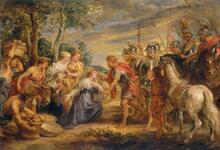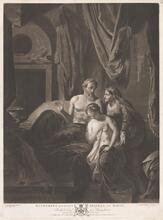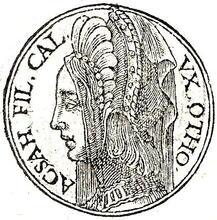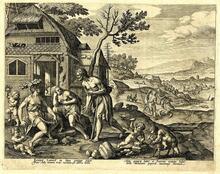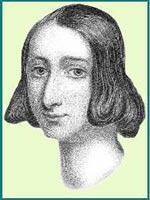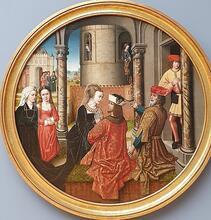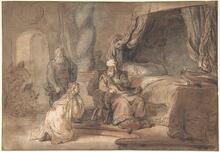Wife of On Ben Pelet: Midrash and Aggadah
The wife of On Son of Pelet is not mentioned in the Bible. However, the midrash credits her for saving her husband’s life. After she saw that he had joined Korah and his company, who were rebelling against Moses and Aaron, she discouraged him from joining the band of malcontents. She saw the long-term effects of her husband joining the revolt. She knew that if On were to fight and lose he would suffer, and if he were to fight and win it would not benefit him greatly. To stop him from joining the revolt she inebriates him and places herself in an immodest position to deter anyone from entering their tent. Her strong character allowed her to perform an “unbecoming” act to achieve a higher goal: rescuing her home and family.
Intervening in her Husband's Narrative
The Torah she-bi-khetav: Lit. "the written Torah." The Bible; the Pentateuch; Tanakh (the Pentateuch, Prophets and Hagiographia)Torah makes no mention of the wife of On Son of Pelet, but the A type of non-halakhic literary activitiy of the Rabbis for interpreting non-legal material according to special principles of interpretation (hermeneutical rules).midrash speaks highly of her, as having saved her husband from death. Num. 16:1 states that On son of Pelet, one of the rebels of the company of Korah, was a Reubenite. He joined Korah, Dathan, and Abiram and the two hundred and fifty men of repute who rose up against Moses and Aaron with the complaint (Num. 16:3): “You have gone too far! For all the community are holy, all of them, and the Lord is in their midst. Why then do you raise yourselves above the Lord’s congregation?” On Son of Pelet completely disappears from the continuation of the Korah narrative, and when the Torah portrays the fate of the rebels in detail, he is not mentioned among those who received their punishment.
The midrash suggests that On’s wise wife saved her husband by extricating him from the band of malcontents. After she saw that he had joined Korah and his company, she told him: “What will you gain from this quarrel? Now Moses is the teacher, and you are the pupil. And if your rebellion succeeds and Korah replaces Moses, once again, he will be the teacher and you will be the pupil! What will you gain from this revolt?” On told his wife: “What can I do? I took counsel with them, and I swore to them that I would be with them in all!” His wife told him: “‘For all the community are holy’; I know that all the community are holy, and that they are scrupulous in matters of modesty. Sit, and I will save you.” What did she do? She gave him wine to drink, intoxicated him, and laid him down inside the tent. The woman sat at the entrance to the tent and loosened her hair, as if she were bathing. Whoever came to call On saw her and went back. When On awakened, Korah and his company had already been swallowed in the bowels of the earth, the two hundred and fifty notables had been burnt, and On son of Pelet was saved from being swallowed up alive and from being burnt to death.
This explains his name: “On,” because he sat in lamentation (be-onenut) for having participated in the rebellion against Moses and Aaron; “Peleth” because wonders (pela’ot) were performed for him and he was saved from death by virtue of his wife. The Rabbis apply to this woman the first part of Prov. 14:1: “The wisest of women builds her house,” for she saved her household with her wisdom. This is contrasted with the second part of the verse—“but folly tears it down with its own hands”—which the Rabbis use to depict the wife of Korah, since the latter was responsible for the downfall of her house (BT Sanhedrin 109b–110a; Tanhuma [ed. Buber], Korah 24).
Motivations and Characteristics
In this midrashic depiction, the wife of On son of Pelet is a practical and clever woman. She thinks one step ahead and weighs the actions by their consequences. She says that if the revolt were to fail, her husband would suffer grievous harm as a result; and if it were to succeed, then, in any event, her husband would not be advanced. It could be argued that she acted out of personal convenience, since the argument that she proffers to her husband is not based on any principles. As the midrash unfolds, however, it becomes clear that, in essence, she is opposed to the uprising, and when she attempts to persuade her husband, she uses the arguments that she knows will have an effect on him, since she is intimate with him and knows that he is acting out of his lust for power. The wife’s strong character is stressed, in comparison with the conduct of her husband, who is drawn along by the band of rebels. On’s wife no longer relies on his ability to withstand the social pressure of his accomplices. When she wants to execute her plan she sees to it that he becomes inebriated and then lays him down in the tent. In this manner she ensures that her husband will not go to the tent entrance if he hears his fellows outside. In the continuation of the midrash, we see that although the wife is closely acquainted with the strictures of modesty, she is even willing to sit in an immodest manner at the tent entrance in order to save her husband’s life. She performs an “unbecoming” act to achieve a higher goal: rescuing her home and family. This act also symbolically relates to her first words. In her first dialogue with her husband, as well, she also used “improper” tools—utilitarian arguments—to attain a higher aim—the repression of the revolt.
For the wife of Korah, see the entry: The Wife of Korah.

